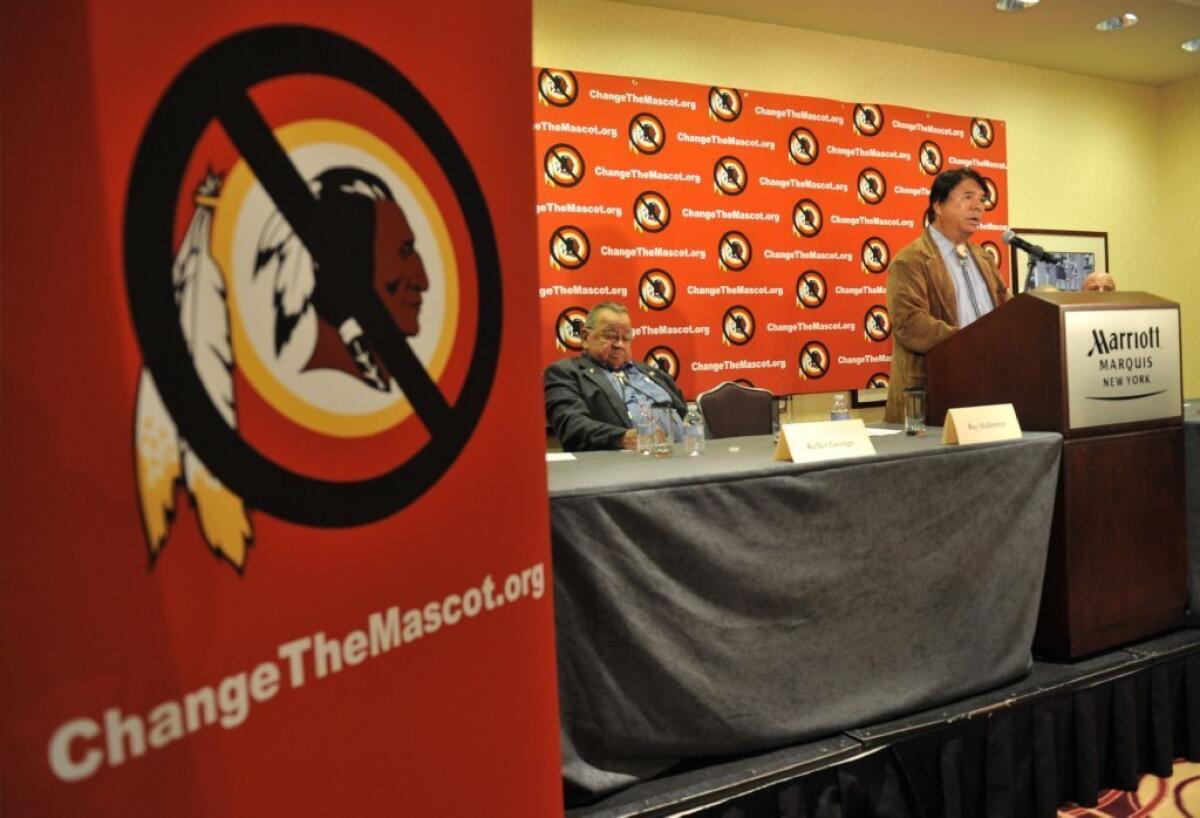Opinion: Forget the poll: ‘Redskin’ offends, and the NFL should drop the name

The battle over whether the word “redskin” is a pejorative took an odd twist with a poll by the Washington Post that found 9 in 10 self-identified Native Americans weren’t offended by the term. Then came a New York Times initiative that drew more than 2,000 responses, heavy on Native Americans arguing that the term is, indeed, racist and offensive. And Indian Country Today argued that only 44% of the Post survey sample belonged to tribes, which means more than half self-identified as Native American, a distinction that could be rooted in little more than family lore.
This new swirl of controversy around the Washington Redskins’ name obfuscates the main issue: For decades, the word has been used as an insult, no matter what the apologists try to argue. Regardless of the word’s etymology — one version is that Native Americans coined it in the 18th century to describe themselves — it’s current use and context is the weight that matters. And as one Native American woman told the New York Times, when schoolmates called her “redskin,” it was a taunt and an insult, not an expression of respect.
The word’s continued embrace by Washington team owner Dan Snyder is indefensible. Tradition? Tradition of what? The term is offensive, and the league — which is made up of Snyder’s fellow team owners, including that of the newly re-minted Los Angeles Rams — should trump Snyder’s intransigent position and force the issue.
But such leadership isn’t likely to come from an entity that has stumbled badly in handling other controversies, including domestic violence and addressing the long-term damage caused by repetitive brain injuries among its players.
The Oxford English Dictionary describes the word as “somewhat dated and frequently considered offensive,” while Webster’s says it is “considered by many to be an offensive term.” “Redskin” is an epithet, and it needs to go.
And the counter-argument that no offense is intended withers away when you see fans dressing up as Native American stereotypes, and recognize that the original lyrics to the team’s fight song included mock language. But even if the argument is granted that offense wasn’t intended, the offense is still there.
‘Redskin’ is an epithet, and it needs to go.
Also, this whole idea that a survey can tell us whether a concept is offensive leads to silliness. If 50% plus one of Americans in a survey said they didn’t consider the N-word to be offensive, would it come back into acceptable use? What is the line for acceptance?
Even if “redskins” was deemed to be inoffensive, what possible good comes from marketing a sports team or any other product as an ethnic stereotype?
And yes, we should also look askance at Notre Dame’s “Fighting Irish” nickname and its mascot, a dukes-up leprechaun, although a private university with a deep Irish American history can claim some latitude in how it self-identifies. A profit-generating professional sports franchise that has neither history with nor an intrinsic connection to Native Americans ought to be held to a different standard.
No matter what a poll might say.
Even if the name ‘Redskins’ is hateful, it deserves 1st Amendment protection
That Washington NFL team? Don’t even say its racist name
When does free speech become a threat?
Follow my posts and re-tweets at @smartelle on Twitter
More to Read
A cure for the common opinion
Get thought-provoking perspectives with our weekly newsletter.
You may occasionally receive promotional content from the Los Angeles Times.







